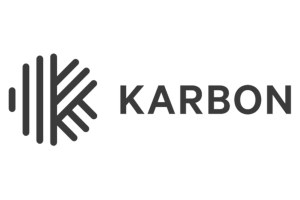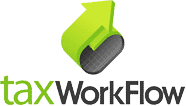Accounting firms with basic needs, such as client management, project and task management, and time tracking and invoicing, may do well with a simple accounting practice tool like Jetpack Workflow and QuickBooks Online Accountant. However, firms and accountants with specialized needs, such as customer relationship management (CRM), capacity management, and document management, may need a more robust solution like Karbon.
That said, here are our top six best accounting practice management software:
- Karbon: Best overall accounting practice management software
- Jetpack Workflow: Best for basic workflow automation
- QuickBooks Online Accountant: Best for managing QuickBooks Online clients
- Financial Cents: Best for tracking profitability by client or project
- Xero Practice Manager: Best for managing Xero clients
- TaxWorkFlow: Best for managing tax processes for clients
Our writers conduct thorough research on each accounting practice management software included in this guide. We sign up for and test each platform firsthand to evaluate its usability, functionality, and user experience. This allows us to provide unbiased reviews and customized recommendations based on the unique needs of your firm. This aligns with our goal, which is to provide the best answers to people’s questions, as summarized in our Fit Small Business Editorial Policy.
Summer Savings: Get 70% off QuickBooks for 3 months. Ends July 31th. |
|
Best Accounting Practice Management Software At a Glance
Which Accounting Practice Management Software is Right for You?
Karbon: Best Overall Accounting Practice Management Software

Pros
- Has a more comprehensive feature set than most similar software
- Includes a unique Triage feature to streamline task and email management
- Has plenty of premade templates for common tasks
- Provides budget vs actual reporting in the Business plan
- Has a mobile app for Android and Mac users
Cons
- Is a bit expensive, especially for small businesses
- Requires a lot of setup work to access complete usability
- May take time to fully understand all its features
- Requires the higher plan to set up automatic client reminders
Karbon offers three subscription options, as listed below:
- Team: $79 monthly per user (paid monthly) or $59 monthly per user (paid annually)
- Business: $99 monthly per user (paid monthly) or $89 monthly per user (paid annually)
- Enterprise: Custom-priced
All plans include standard features, like integrated email, task management, and team collaboration. The higher plans provide additional tools, like task automation, budget vs actual reporting in the Business plan, and a dedicated support manager in Enterprise.
Karbon tops our list of the best accountancy practice management software because it offers all the features we wanted to see. These include task and project tracking, workflow automation, collaboration, and time tracking and billing.
What we like most about it is its unique triage feature, which allows you to assign emails and tasks to team members directly from Karbon. You can create rules so that Karbon automatically assigns specific types of emails to specific team members. Furthermore, with the Business plan, you can create automatic reminders to alert clients of their responsibilities.
Additionally, Karbon comes preloaded with customized templates for different tasks, such as initial setup, weekly reconciliation, year-end review, and cash flow advisory. It also makes it easy to track tasks as it uses a workflow-based approach through a Kanban board view. This means you can instantly see which tasks are ready to start, which are in progress, and which are already completed.
Jetpack Workflow: Best for Basic Workflow Automation

Pros
- Lets you automate routine tasks, like client onboarding, invoice processing, and expense reimbursement
- Allows you to create unlimited jobs, documents, and clients
- Enables you to create recurring projects
- Integrates with QuickBooks Online, Google Workspace, and over 2,000 apps through Zapier
Cons
- Has no CRM features
- Doesn’t allow you to update templates for assigned jobs
- Has no customizable reports
- Lacks a mobile app
- Lacks a document management system; can only store documents within a job’s profile
- Organize: $56 monthly per user (billed monthly); $45 monthly per user (billed annually)
- Scale: $63 monthly per user (billed monthly); $49 monthly per user (billed annually)
You can try any of the two plans for free for 14 days.
Jetpack Workflow is a simple accounting firm practice management software that is focused on workflow automation. It’s not as robust as Karbon, but it can help you streamline processes commonly found in small businesses, such as onboarding new employees.
For instance, if your company has a new hire, Jetpack Workflow allows you to create a task template for the onboarding process. Once a new employee is added to the system, the program assigns the onboarding template automatically to responsible team members so that you don’t have to delegate it manually.
Jetpack Workflow isn’t that scalable and may not be ideal for firms with complicated workflows as it lacks advanced features, like CRM and a client portal. If you have a bit more complicated workflows, such as lead management and conversion, then you may appreciate Karbon.
QuickBooks Online Accountant: Best for Managing QuickBooks Online Clients

Pros
- Is free and includes a subscription to QuickBooks Online Advanced
- Comes with a portal to your client's QuickBooks Online books
- Seamlessly integrates with Intuit ProConnect Tax for streamlined tax filing
- Lets you track projects across multiple clients
- Provides free access to the QuickBooks Online ProAdvisor program
Cons
- Is incompatible with QuickBooks Desktop
- Has no due date list
- Doesn't calculate realization percentage when employee time is written off of a job or project
- Lacks CRM and document management features
QuickBooks Online Accountant is free for accountants and bookkeepers. It includes a portal to your clients’ books, QuickBooks Online Advanced to use for your firm’s books, and access to the QuickBooks Online ProAdvisor program.
QuickBooks Online Accountant is specifically designed to work with QuickBooks Online, our overall best small business accounting software. It provides specialized tools, such as the ability to review and adjust clients’ accounts and reclassify transactions. You even get access to the QuickBooks ProAdvisor Program, which enables you to support your clients regardless of their version of QuickBooks Online.
Additionally, accountants can take advantage of the free QuickBooks Online Advanced subscription to manage their own books. What’s more, you and your clients can access and work on the same financial data in real time. This means both of you can simultaneously work with the most recent data, eliminating the need for file transfers.
If you or your firm provides general accounting services to your QuickBooks Online clients, like financial statement preparation, payroll processing, and tax filing, then QuickBooks Online Accountant is a necessity. However, more complex accounting firms with specialized needs, such as wealth management and forensic accounting firms, should consider a more comprehensive solution like TaxWorkFlow or Karbon in addition to QuickBooks Online Accountant.
Financial Cents: Best for Tracking Profitability by Client or Project

Pros
- Lets you compare the amount billed to the hours tracked
- Is more affordable than most paid accounting practice management software
- Offers advanced features, such as client portal, client requests management, and document management
- Integrates with QuickBooks Online for invoicing
- Has a comprehensive capacity management feature
Cons
- Is not a complete bookkeeping solution
- Requires QuickBooks integration to send invoices
- Has limited reporting capabilities
- Doesn’t provide extensive customization options for workflow templates
You can choose from two Financial Cents subscription options:
- Team: $49 monthly per user (billed monthly) or $39 monthly per user (billed annually); has basic features like workflow automations, document management, and time tracking and billing
- Scale: $69 monthly per user (billed monthly) or $59 monthly per user (billed annually); has additional features, such as client task email customization and automatic follow-up for client tasks
You can try either plan for free for 14 days with no credit card required.
We find Financial Cents excellent accountant practice management software for those managing multiple clients and engagements, especially those that are focused on analyzing returns on investment from every project they handle. It allows you to compare the amount billed to your hours tracked that, in turn, provides you with an effective hourly rate for your work.
By accurately calculating your effective hourly rates, you’ll understand whether you are fairly compensated for your time and effort. Also, it helps you identify which clients are the most profitable based on factors like the amount billed per hour worked and the complexity of projects. This way, you may choose to prioritize high-profit clients or adjust your pricing accordingly.
On the downside, Financial Cents requires QuickBooks integration to send invoices. If your firm relies on sending invoices on behalf of your clients heavily, then you may be better served by Karbon.
Xero Practice Manager: Best for Managing Xero Clients

Pros
- Is free for Silver, Gold, and Platinum partners
- Has strong time and billing features including a dedicated time sheets section
- Allows you to allocate jobs and tasks with due dates
- Offers a variety of integration options and a dedicated mobile app
- Robust mobile app with many features
Cons
- Is expensive for new and Bronze-level partners
- Lacks tools for efficient team collaboration within the software
- Has no telephone support
- Reduces discount rates for new partners
New Xero partners and those at Bronze level can try Xero Practice Manager free for 14 days. Then, you can subscribe for $149 per month for up to 10 users. There is no charge once you reach Silver, Gold, or Platinum partner status.
If you have clients using Xero and need a strong billing system, then you should consider Xero Practice Manager. It helps you efficiently manage client jobs, practice workflows, timesheets, and invoicing and lets you assign work to staff, track and invoice time, integrate with Xero for invoicing and payments, and create customized reports. The platform also generates performance metrics that can provide useful insight into your firm’s profitability.
Unfortunately, small startup firms and solo practitioners may struggle to earn enough points to reach the Silver, Gold, or Platinum partner levels. Hence, if you are still in the early stages of generating revenue, you may find the $149 monthly cost a burden. We recommend you consider Jetpack Workflow, which is a bit more affordable. Also, it integrates with the Xero accounting software, so you can easily sync your client’s data between the two programs.
TaxWorkFlow: Best for Managing Tax Processes for Clients

Pros
- Lets you select where to store data (in-house or in the cloud)
- Has CRM features, including the ability to create email marketing campaigns
- Allows collaboration with clients using an integrated Outlook calendar
- Has a due date list
- Integrates with several accounting solutions, including QuickBooks
Cons
- Has no direct access to your client’s books
- Is a desktop software; required installation
- Has no monthly subscription
- Doesn’t integrate with accounting software
- Can’t send invoices through the mobile app
TaxWorkFlow is available at a flat annual fee of $1,500, which includes free support and unlimited users. The fee will remain the same as long as you are a client.
As an effort to help small businesses during the COVID-19 pandemic, new users can sign up for TaxWorkFlow for free for six months without any subscription fees or initial deposits.
TaxWorkFlow is the best accounting practice management software for tax firms providing ongoing services such as annual tax returns, monthly bank statement reconciliation, and compilations of financial statements. It offers a centralized platform for accountants to store and access client data, tax forms, supporting documents, and communication records.
It allows you to create, assign, and track tax-related tasks. You can also set up deadlines, monitor task progress, and be alerted for upcoming or overdue activities. Additionally, the platform helps you simplify tax filing by automating calculations and providing built-in tax tools. Enter the data, and it will handle the necessary calculations, such as income tax liability, deductions, and credits.
However, TaxWorkFlow can be pricey for small accounting firms and solo practitioners. Also, as desktop software, it may be unideal for accountants who often work out of their offices. If you need online access to your clients’ books, you may consider Karbon or QuickBooks Online Accountant if your clients are using QuickBooks Online.
How We Selected the Best Accounting Practice Management Software
We evaluated and selected the best accountancy practice management software based on key factors, including:
- Pricing: We evaluated whether the software’s pricing generally is affordable for most small accounting firms and whether it provides benefits, such as free trials and multiple user access.
- Ease of use: We tested each software to see how easy they are to navigate and use. The dashboard must be streamlined and provide an easy way to assign tasks and manage your clients’ books.
- Feature set: We focused on essential features, such as the ability to create customized workflows, collaborate with team members, and create and assign tasks as well as easily track their statuses.
- Scalability: We checked whether there’s an option to upgrade to a higher plan that has additional features and supports multiple users.
- Integration capabilities: Good accounting practice management software integrates with various business apps, such as accounting and CRM solutions.
- Customer support: We assessed whether the provider has convenient customer support options, such as live chat, phone, and email support.
Frequently Asked Questions (FAQs)
You must look for advanced features, such as time tracking and billing, project management, document management, CRM, and reporting.
No, as most platforms are designed to be easy to use and don’t require special training. However, for beginners, software providers offer free training tools and resources to help you better understand their platforms.
Yes, and a good example is QuickBooks Online Accountant, which is designed to be used by accountants with clients using QuickBooks Online.
Bottom Line
The best accounting practice management software depends on your specific needs. We have provided six options—all with varied use cases—to help you find one that fits the bill. Once you consider your needs and the type of businesses that you cater to, you’ll be able to select the best fit for your business.
User review reference:
[1]Capterra | Karbon



